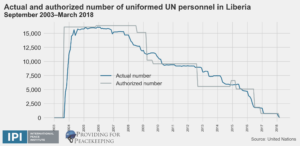Traditional Liberian dancers perform during a farewell for the United Nations Mission in Liberia (UNMIL) organized by the NGO Liberia Crusaders for Peace in Monrovia. The ceremony included musical and cultural performances and messages expressing gratitude. March 27, 2018. (UN Photo/Albert González Farran)
From 2003 to 2018, the UN Mission in Liberia (UNMIL) was ever-present throughout the country. The peacekeeping mission’s work, and its transition out of the country, are considered positive examples of how the UN can support countries through conflict and post-conflict phases. Nevertheless, UNMIL’s transition offers many lessons that member states, UN officials, and international partners can learn in order to strengthen future UN peacekeeping transitions.
This paper examines the process of Liberia’s transition from a peacekeeping mission to a UN country team configuration, focusing on the period from July 2016 to July 2018. It identifies the political and operational dynamics that drove the transition, examines the policy processes and context within which the transition was executed, and assesses the ability of the UN’s post-mission configuration to sustain peace in Liberia.
The paper underscores that member states and the UN Secretariat should change their approach to transitions from racing against deadlines to instead viewing them as processes that begin well before a peacekeeping mission closes and continue for several years after the mission ends. By viewing transitions as long-term, multi-stakeholder activities, member states have the opportunity to ensure that future transitions adopt integrated approaches with adequate political, operational, and financial support.









